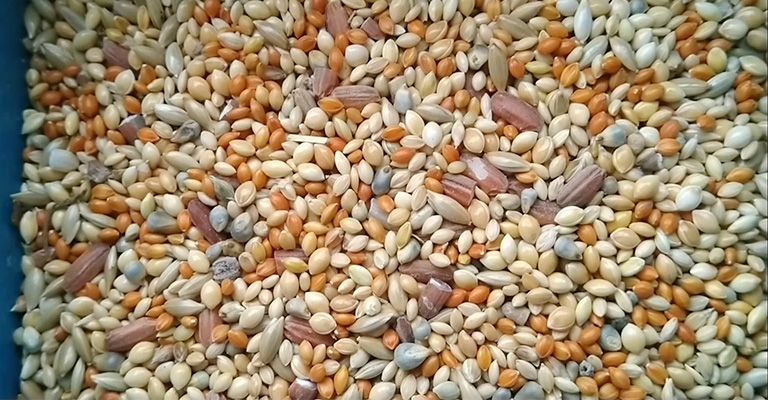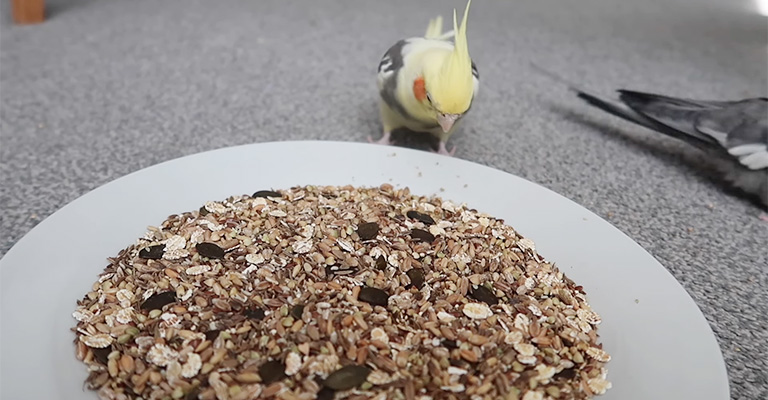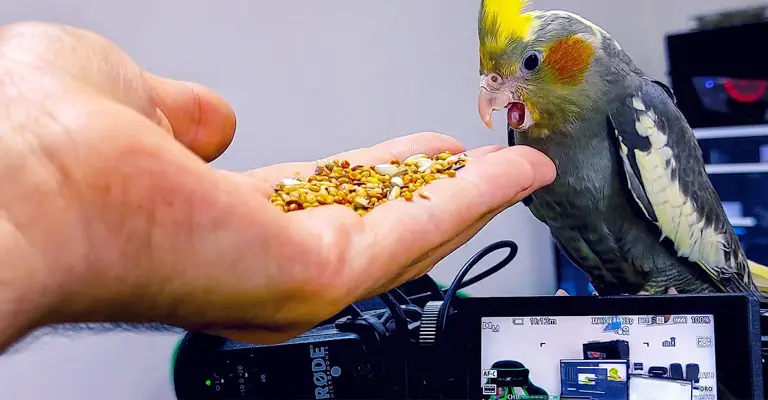The dietary needs of our feathered companions, such as cockatiels, are of paramount importance to their health and well-being. As pet owners, we often wonder, “Can cockatiels eat birdseed mix?”
Bird seed mixes are a common choice for feeding various avian species, but when it comes to cockatiels, there are specific considerations to bear in mind.
Cockatiels are delightful parrots known for their playful personalities and unique dietary requirements.
We will delve into the suitability of birdseed mixes for cockatiels and the factors that influence their dietary choices. Understanding what makes a balanced diet for these charming birds is crucial in ensuring their longevity and vitality.
We will also discuss the importance of incorporating a variety of foods into their diet to meet their nutritional needs.
So, let’s unravel the complexities of cockatiel nutrition and address the question of whether birdseed mix should play a role in their daily menu.

Can Cockatiels Eat Birdseed Mix?
Bird seed mix is a common food for many pet birds, but it should not be the only food for your cockatiel. Bird seed mix can provide some benefits for your cockatiel, but it also has some drawbacks.
Here are some potential benefits of birdseed mix for your cockatiel:
Provide Energy And Calories
Bird seed mix is rich in carbohydrates and fats, which can give your cockatiel the energy and calories it needs to fly, play, and stay active.
However, too much birdseed mix can also cause obesity and health problems, so you should limit the amount of birdseed mix you offer to your cockatiel.
Some Variety And Stimulation
Bird seed mix usually contains different types of seeds and nuts, which can offer some variety and stimulation for your cockatiel.
Your cockatiel may enjoy picking and choosing its favorite seeds from the mix or cracking the shells of the nuts.
However, birdseed mix can also be boring and unbalanced, so you should supplement it with other foods, such as pellets, fruits, vegetables, and treats.
Help With Molting And Feather Health
Bird seed mix can provide some essential fatty acids, such as omega-3 and omega-6, which can help with molting and feather health in your cockatiel.
Molting is the process of shedding old feathers and growing new ones, which usually happens once or twice a year in cockatiels. Fatty acids can help your cockatiel to produce healthy and shiny feathers.
Support The Immune System And Disease Resistance
Bird seed mix can provide some antioxidants, such as vitamin E and selenium, which can support the immune system and disease resistance in your cockatiel. Antioxidants can help your cockatiel to fight off infections and inflammation.
Aid Digestion And Gut Health
Bird seed mix can provide some fiber, which can aid digestion and gut health in your cockatiel.
Fiber can help your cockatiel to regulate its bowel movements and prevent constipation or diarrhea.
However, too much fiber can also cause gas or bloating, so you should not overfeed your cockatiel with birdseed mix.
Mimic The Natural Diet Of Wild Cockatiels
Bird seed mix can mimic the natural diet of wild cockatiels, who eat a variety of seeds (grass seeds), fruits, berries, and vegetation in their native habitat of Australia.
Feeding your cockatiel a diet that resembles its natural diet can help it maintain its instinctive behaviors and preferences.
Convenient And Affordable
Bird seed mix can be convenient and affordable for many pet owners, as it is widely available in pet stores and online shops.
You can easily store bird seed mix in a cool and dry place for a long time without spoiling.
However, you should always check the expiration date and the quality of the birdseed mix before feeding it to your cockatiel.
Customized And Enhanced
Bird seed mix can be customized and enhanced to suit your cockatiel’s needs and preferences. You can add or remove certain seeds or nuts from the mix, or you can sprout them to increase their nutritional value.
You can also add other ingredients to the birdseed mix, such as dried fruits, vegetables, herbs, or spices.
Can Be Used As A Training Tool Or A Reward
Bird seed mix can be used as a training tool or a reward for your cockatiel, as it is highly palatable and preferred by most birds.
You can use birdseed mix to teach your cockatiel new tricks, such as stepping up, waving, shaking hands, spinning, or ringing a bell.
You can also use birdseed mix to reward your cockatiel for good behavior or for completing a task.
How To Prepare Bird Seed Mix For My Cockatiels?

Bird seed mix can be a good source of energy, variety, and stimulation for your cockatiels, but it should not be the only food they eat.
You should also provide them with pellets, fruits, vegetables, and treats to ensure a balanced and nutritious diet.
Here are some techniques on how to prepare birdseed mix for your cockatiels:
Choose High-Quality And Organic Seeds
You should choose high-quality and organic seeds that are fresh, clean, and free of pesticides, preservatives, or additives.
You can buy them from reputable pet stores or online shops, or you can use human-grade seeds from health food stores or supermarkets.
Some examples of seeds that are suitable for cockatiels are millet, quinoa, oats, barley, wheat, rye, flax, sesame, and hemp.
Mix Different Types Of Seeds
You should mix different types of seeds to provide your cockatiels with a variety of nutrients, flavors, and textures. You can follow a recipe or create your own mix according to your cockatiels’ preferences.
A general guideline is to use about 50% millet, 25% other small seeds, and 25% other large seeds. You can also add some nuts, such as almonds, walnuts, or pistachios, for extra protein and fat.
Store The Seed Mix Properly
You should store the seed mix in an airtight container in a cool and dry place, away from sunlight and moisture.
This will prevent the seeds from spoiling or becoming moldy. You should also check the expiration date and the quality of the seeds before feeding them to your cockatiels. You can also freeze the seed mix for longer storage.
Soak Or Sprout The Seeds
You can soak or sprout the seeds to increase their nutritional value and digestibility. To soak the seeds, you need to rinse them well and soak them in fresh water for about 8 to 12 hours.
Then you need to drain them and rinse them again before feeding them to your cockatiels.
To sprout the seeds, you need to follow the same steps as soaking, but then you need to place them in a sprouting jar or tray and keep them moist and warm for about 2 to 4 days until they sprout. You need to rinse them twice a day to prevent mold growth.
Offer Fresh Water For Bathing
You should offer fresh water for bathing your cockatiels regularly to help them keep their feathers clean and hydrated.
Bathing also helps them remove the keratin sheath from their pin feathers during molting. You can offer your cockatiels a shallow dish of water, a spray bottle, or a shower perch.
Let your cockatiels choose how and when they want to bathe and avoid using soap or shampoo.
Encourage Preening
You should encourage preening to your cockatiels to help them groom and arrange their feathers with their beaks. Preening also helps them remove dirt, dust, parasites, and dead feathers from their plumage.
You can help your cockatiels preen by gently rubbing or scratching their head, neck, and cheeks with your finger or thumb. You can also provide them with preening toys or a soft brush.
Support Molting
You should support molting your cockatiels by providing them with extra care and attention during this period. Molting is the process of shedding old feathers and growing new ones, which usually happens once or twice a year in cockatiels.
Molting can make your cockatiels feel uncomfortable and irritable. During molting, you should provide your cockatiels with more food, water, rest, and comfort.
Inspect the feathers regularly
You should inspect the feathers of your cockatiels regularly for any signs of damage, disease, or abnormality.
Some common feather problems include mites, lice, fungal infections, bacterial infections, viral infections, feather plucking, nutritional deficiencies, hormonal imbalances, genetic disorders, or physical injuries.
If you notice any of these issues in your cockatiels’ feathers, you should consult a veterinarian for diagnosis and treatment.
Avoid Harsh Grooming Practices
You should avoid harsh grooming practices for your cockatiels, such as pulling, trimming, or clipping their feathers without proper guidance from an experienced avian groomer or veterinarian.
These practices can cause pain, bleeding, infection, or stress to your cockatiels. They can also affect your cockatiels’ ability to fly, balance, and communicate.
What Seeds Can Cockatiels Not Eat?

Cockatiels are seed-eating birds, but not all seeds are safe or healthy for them. Some seeds can be toxic, harmful, or unbalanced for your cockatiel’s diet.
Here are some kinds of seeds that cockatiels should not eat:
Apple Seeds
Apple seeds contain a small amount of cyanide, which is a poisonous substance that can cause cardiac arrest in cockatiels.
Cyanide can also interfere with the oxygen transport in the blood and cause respiratory distress. You should always remove the apple seeds before feeding them to your cockatiel.
Avocado Pits
Avocado pits are very hard and can cause choking or intestinal blockage in cockatiels.
Avocado pits also contain persin, which is a toxin that can damage the heart, lungs, liver, and kidneys of cockatiels. You should never feed avocado or any part of it to your cockatiel.
Cherry Pits
Cherry pits are similar to apple seeds in that they contain cyanide and can cause the same symptoms and effects in cockatiels.
Cherry pits are also very hard and can cause dental or digestive problems in cockatiels.
You should always remove the cherry pits before feeding cherries to your cockatiel.
Onion Seeds
Onion seeds are not commonly found in birdseed mixes, but they can be present in some human foods or spices that you may want to share with your cockatiel.
Onion seeds contain thiosulphate, which is a compound that can cause hemolytic anemia in cockatiels.
Hemolytic anemia is a condition where the red blood cells are destroyed, and the oxygen-carrying capacity of the blood is reduced. You should avoid feeding onion or any part of it to your cockatiel.
Garlic Seeds
Garlic seeds are also not common in bird seed mixes, but they can be found in some human foods or spices that you may want to share with your cockatiel.
Garlic seeds contain allicin, which is a compound that can cause hemolytic anemia in cockatiels as well.
Allicin can also irritate the digestive tract and cause vomiting or diarrhea in cockatiels. You should avoid feeding garlic or any part of it to your cockatiel.
Poppy Seeds
Poppy seeds are often used as a topping or ingredient in baked goods, such as breads, muffins, cakes, or pastries.
Poppy seeds contain opium alkaloids, such as morphine and codeine, which are narcotic substances that can affect the nervous system and behavior of cockatiels.
Opium alkaloids can cause sedation, depression, respiratory depression, or even death in cockatiels. You should avoid feeding poppy seeds or any food that contains them to your cockatiel.
Sunflower Seeds
Sunflower seeds are not toxic to cockatiels, but they are very high in fat and calories, which can cause obesity and health problems in cockatiels. Obesity can lead to fatty liver disease, heart disease, arthritis, or diabetes in cockatiels.
Sunflower seeds also lack many essential nutrients that cockatiels need, such as vitamins, minerals, and amino acids.
You should limit the amount of sunflower seeds you feed to your cockatiel and offer them as occasional treats only.
Safflower Seeds
Safflower seeds are similar to sunflower seeds in that they are not toxic to cockatiels, but they are very high in fat and calories, which can cause obesity and health problems in cockatiels as well.
Safflower seeds also lack many essential nutrients that cockatiels need, such as vitamins, minerals, and amino acids.
You should limit the amount of safflower seeds you feed to your cockatiel and offer them as occasional treats only.
Moldy Or Spoiled Seeds
Moldy or spoiled seeds can be very dangerous for cockatiels, as they can contain fungi, bacteria, toxins, or parasites that can cause infections, poisoning, or diseases in cockatiels.
Moldy or spoiled seeds can cause symptoms such as vomiting, diarrhea, loss of appetite, weight loss, lethargy, depression, breathing difficulties, seizures, or death in cockatiels.
You should always check the quality and freshness of the seeds you feed to your cockatiel and discard any moldy or spoiled seeds.
These are some of the kinds of seeds that cockatiels should not eat. You should always provide your cockatiel with a balanced and varied diet that includes pellets, fruits, vegetables, and treats.
You should also consult your veterinarian for more advice on what to feed and what not to feed to your cockatiel.
FAQ
No, cockatiels should not eat birdseed mix as their primary diet. While it can be included as an occasional treat, their main diet should consist of high-quality pellets, fresh fruits, vegetables, and other foods to ensure they receive essential nutrients.
Yes, commercial bird seed mixes formulated for parrots and cockatiels can be safe to offer. However, they should be a small part of their diet, and it’s essential to choose high-quality mixes without filler ingredients.
A diet primarily consisting of birdseed mix can lead to nutritional imbalances, obesity, and potential health issues in cockatiels. It lacks some essential nutrients and may be too high in fats and carbohydrates.
Offer birdseed mix as an occasional treat or as part of a balanced diet. Limit the amount to a small portion, and ensure that the majority of their food comes from high-quality pellets, fresh vegetables, and fruits.
Cockatiels should avoid seeds high in fat, such as sunflower seeds, in large quantities. These seeds can contribute to obesity. It’s best to choose mixes that contain a variety of seeds and grains to provide some dietary diversity without excessive fat.
Conclusion
In the realm of cockatiel care, the question of whether they can eat birdseed mix reveals the intricate nature of avian nutrition.
As we’ve explored, while birdseed mix can be included in a cockatiel’s diet, it should not be the primary or sole source of nutrition.
These charming parrots have specific dietary requirements that go beyond what typical birdseed mixes offer.
A balanced cockatiel diet should consist of high-quality pellets, fresh vegetables, fruits, and the occasional treat of birdseed mix. This variety ensures they receive the essential nutrients, vitamins, and minerals necessary for their health and longevity.